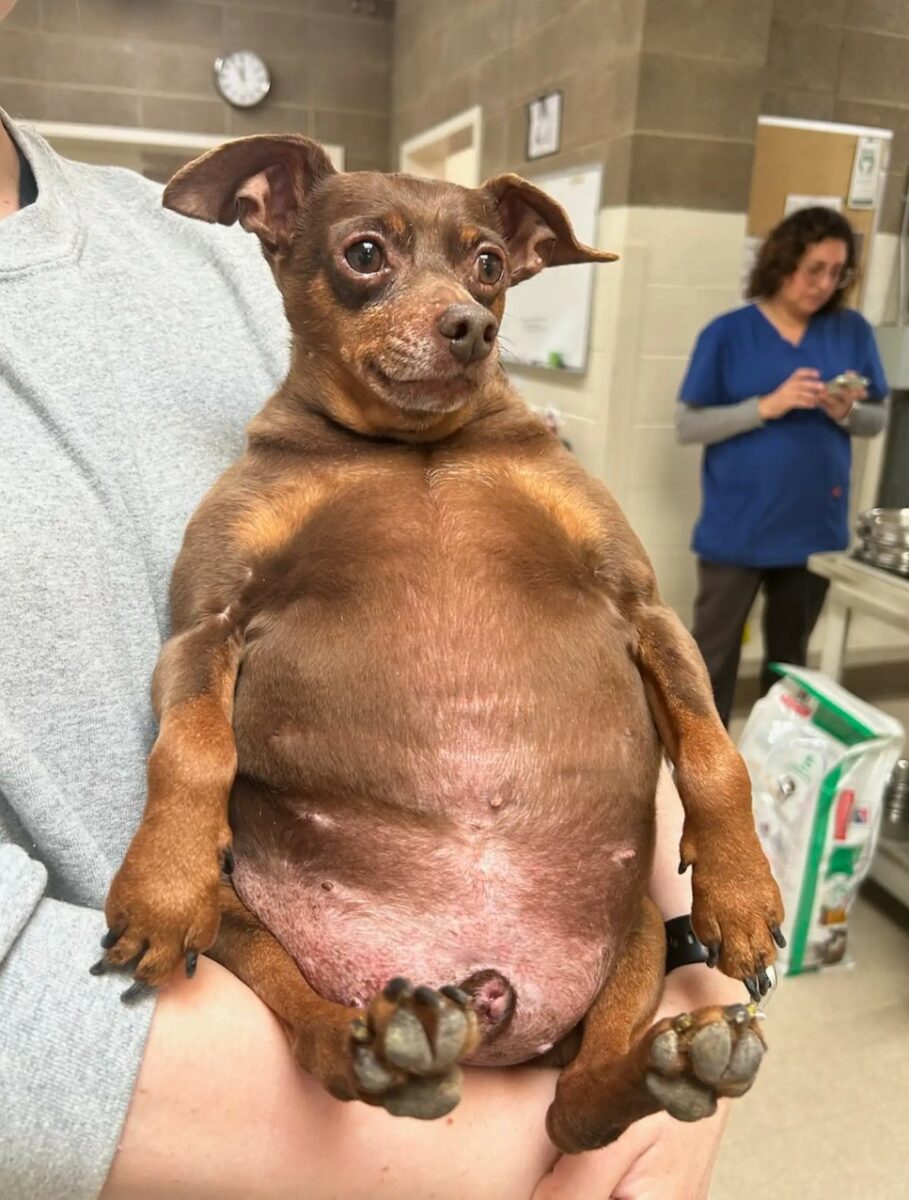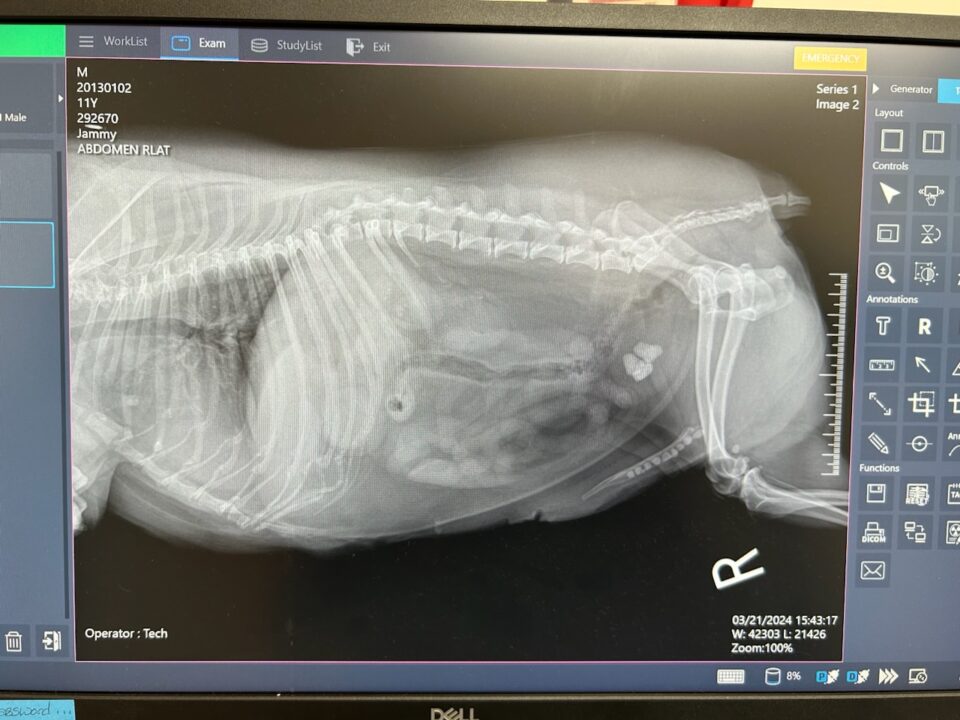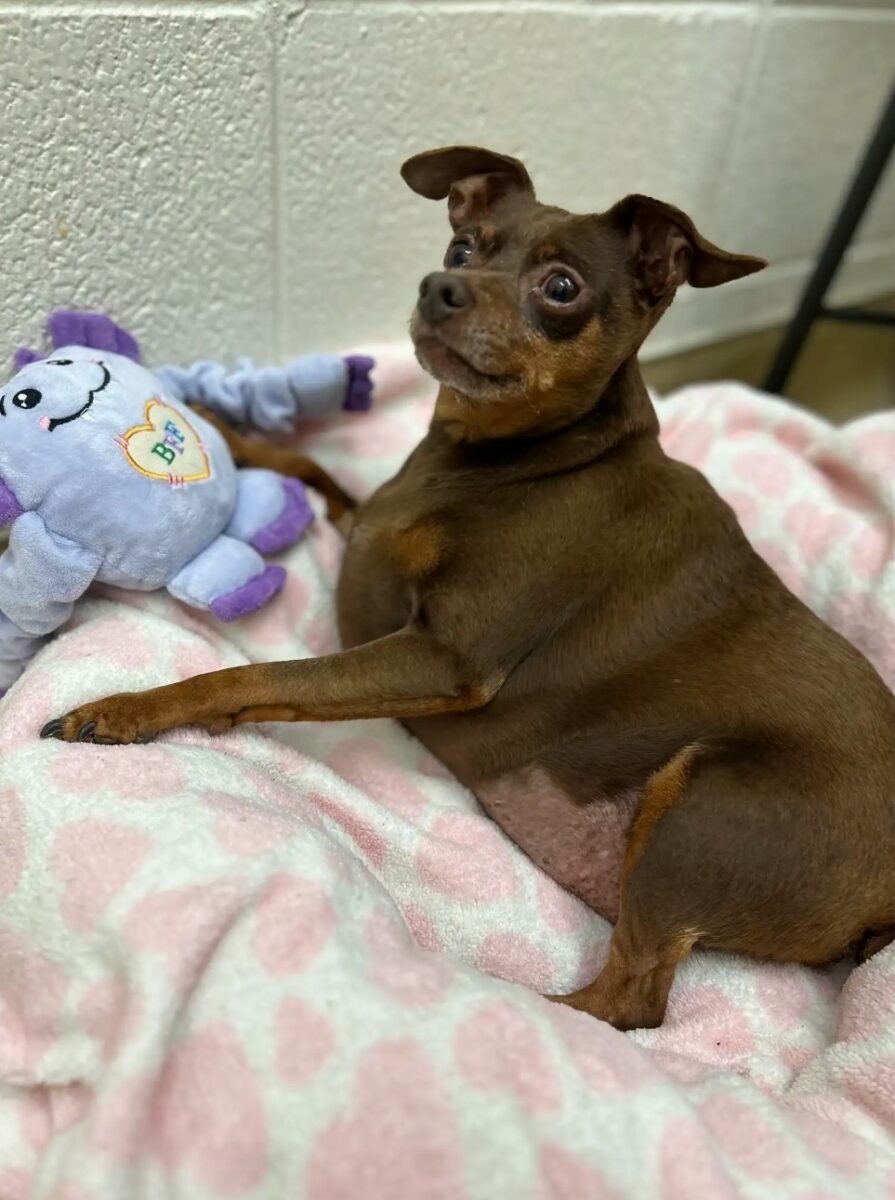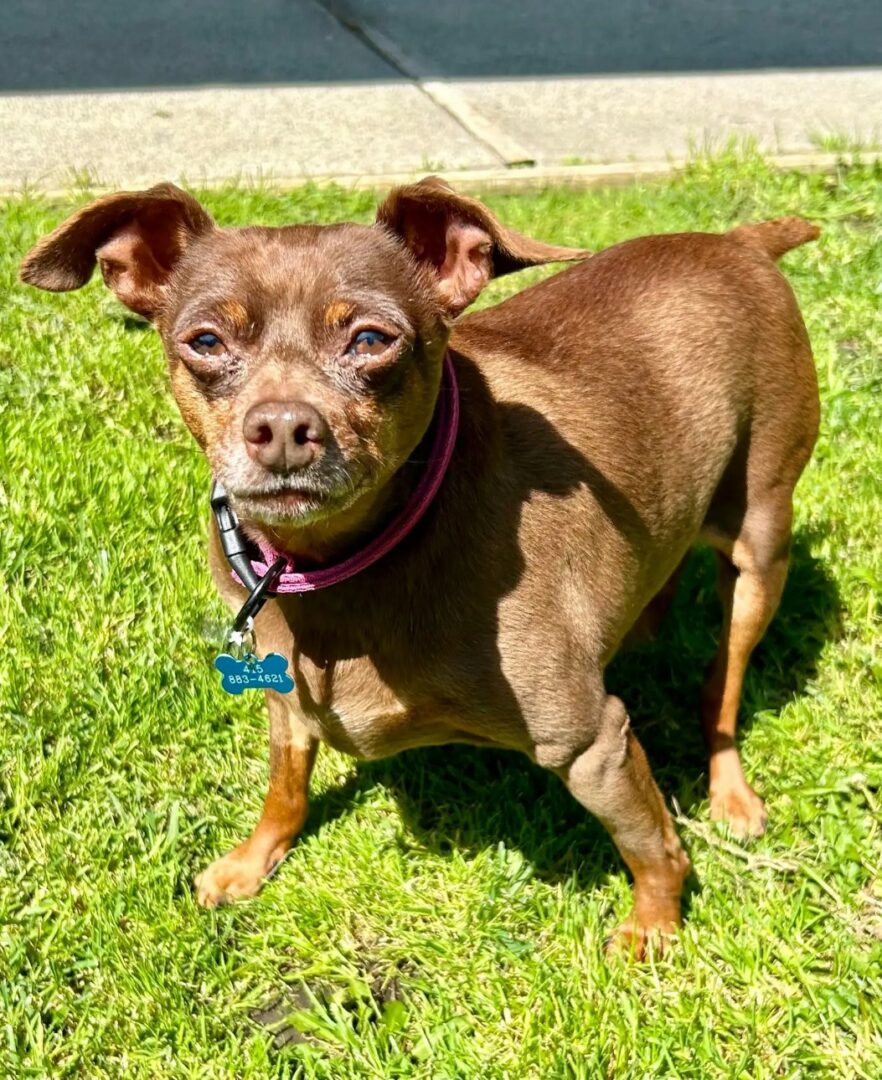When a tiny, adorable puppy by the name of Jammy arrived at Marin Humane, an independent nonprofit rescue in Novato, California, he was an immediate hit.
Having the most adorable smile and the sweetest personality made him loved among the staff.
However, Jammy was also very chubby, and the shelter staff had to work on this.
Meet Jammy

When he was surrendered to the Novato shelter after his owner was no longer able to care for him, Jammy weighed 17.6 pounds.
Being such a small dog, his ideal weight would be around ten pounds, meaning that he was really overweight. Jammy could barely move around on his own, so being carried around all the time was something that he thoroughly enjoyed.
Unfortunately, weight wasn’t his only issue. After some checkups, the staff discovered that he had 13 bladder stones that had to be removed immediately. But, Jammy didn’t allow this to get in the way of his happiness.

Despite his health issues, he was a very charming boy who loved spending his time with all the new hoomans he met.
“Jammy is a charming, funny little dude. He’s friendly and easy-going, and he’s been social with everyone he’s met. He also has some silly quirks; for example, he’s enjoyed playing with a cat wand toy! He’s gone through lots of handling in his time at our shelter, due to his health issues, and he’s been a superstar through all of it,” Julia Lamont, social media and marketing specialist at Marin Humane, told The Dodo.

Looking For A Home
After the surgery in which the vets removed his bladder stones, Jammy spent some time in a loving foster home in order to recover.
The incredible environment allowed him to recover in no time, and Jammy was back at the shelter looking for a warm forever home. In the meantime, however, he is slowly losing his extra weight and dreaming of an active family that will help him become as healthy as he is happy.

He is an expert snuggler and loves walking around in the sun, pulling his hooman wherever he wants to go.
Jammy is also very vocal at mealtimes and will make everybody aware of his opinions on the food that he is given. Since he has spent his days living alongside other animals, he would undoubtedly love the companionship of a furry sibling with whom he could have fun and adventurous playdates.
Overall, this incredibly sweet boy is a true gentleman who wants nothing more but a loving family to take him in.

If you are interested in adopting Jammy and providing him with a happy and loving home that will allow him to reach his ultimate goal, please contact Marin Humane for more information.
If you’ve ever wondered why your furry friend can’t seem to stop showering you with slobbery kisses, you’re not alone. Dog licking is a common behavior that can leave many pet owners puzzled. From gentle licks to more enthusiastic slurps, your canine companion’s licking habits can vary in intensity and frequency. Understanding the reasons behind this behavior can offer insights into your dog’s emotions and communication style. So, the next time your pup starts licking, it might be more than just a sign of affection. Stay tuned to uncover the fascinating reasons behind why your dog is constantly licking you.
Understanding Canine Licking Behavior
The Basics of Licking as Communication
When your dog licks you, it’s not just a simple action. Dogs use licking as a form of communication with their owners. It can convey various messages beyond just showing affection. Understanding this basic form of communication is essential to decipher what your dog is trying to express.
Exploring Affection and Attention-Seeking
While licking can indeed be a sign of affection, it can also indicate that your dog is seeking attention from you. By licking you, your dog might be trying to engage with you or express their desire for interaction. It’s important to recognize these subtle cues to strengthen your bond with your furry companion.
Medical and Behavioral Reasons Behind Excessive Licking
Identifying Health Issues
If your dog is constantly licking you, it could be a sign of an underlying health problem. Skin allergies, infections, or even pain could be causing this behavior. It’s essential to consult your vet to rule out any medical issues that might be triggering the excessive licking.
Addressing Anxiety and Boredom
Dogs may lick excessively due to anxiety or boredom. Just like humans, dogs can experience stress and may resort to licking as a way to self-soothe. Making sure your furry friend gets enough mental and physical stimulation can help alleviate anxiety and boredom, reducing their excessive licking behavior.
The Role of Human-Dog Bonding
Reinforcement of Licking Behavior
When your dog constantly licks you, it’s essential to understand how your reactions can reinforce this behavior. Dogs are social animals that seek attention and affection from their owners. If you react positively to licking by giving pets or attention, your dog may view this as a rewarding behavior. To discourage excessive licking, avoid reinforcing it by redirecting your dog’s attention to an appropriate activity when they start licking excessively. Providing alternative behaviors like playing with a toy can help shift their focus away from licking.
Establishing Rules and Boundaries
Setting clear rules and boundaries is vital in managing your dog’s behavior, including excessive licking. Dogs thrive on structure and consistency, so establishing boundaries helps them understand what is acceptable behavior. When your dog starts licking excessively, calmly but firmly redirect their attention and set limits. For example, you can gently remove your hand or turn away to signal that licking is not allowed. Consistency in enforcing these boundaries will help your dog learn what behavior is appropriate, strengthening your bond while limiting excessive licking.
Strategies for Managing Your Dog’s Licking
Training Techniques to Reduce Licking
Train your dog to respond to a “no lick” command. When your dog attempts to lick you, calmly say “no lick” and redirect their attention to a toy or treat. Consistency is key; reinforce this command every time your dog licks excessively to help them understand the boundary.
Consider positive reinforcement training. Reward your dog with treats and praise when they refrain from licking. This will encourage them to exhibit more desirable behavior and reduce the frequency of licking.
Consult a professional dog trainer. If your dog’s licking behavior persists despite your efforts, seek guidance from a professional trainer who can tailor a training plan to address this specific issue effectively.
Alternatives to Redirect Your Dog’s Attention
Provide interactive toys and puzzles to keep your dog mentally stimulated. Engaging your dog in activities that require focus can divert their attention away from licking. Interactive toys can be a fun and effective way to redirect their energy.
Engage in regular exercise with your dog. Physical activity not only helps keep your dog healthy but also serves as a great distraction from licking. Take your dog for walks, play fetch, or engage in other interactive games to channel their energy positively.
Offer chew toys and bones as an alternative outlet for licking urges. Chewing can be a soothing and natural behavior for dogs. Providing appropriate chew toys can help satisfy your dog’s need to lick or chew on objects.
Establish a consistent daily routine for your dog. Predictability can help reduce anxiety and stress, which are common triggers for excessive licking. By creating a stable environment with set feeding times, exercise routines, and playtime, you can help your dog feel more secure and less prone to constant licking.
When to Seek Professional Help
Recognizing Signs that You Need a Vet or a Behaviorist
When your dog’s licking behavior becomes uncontrollable and starts to interfere with daily activities, it’s time to seek help from a veterinarian or a behaviorist. Signs that indicate the need for professional assistance include persistent licking despite training efforts, physical signs of irritation or injury, and increased anxiety or stress in your dog. These professionals can assess the underlying reasons for the excessive licking and provide tailored solutions to address the issue effectively.
Consulting with Pet Professionals
Consulting with pet professionals, such as veterinarians or certified dog behaviorists, can provide valuable insights into your dog’s licking behavior. These experts have the knowledge and experience to identify any medical conditions that may be causing the excessive licking and can recommend appropriate treatment options. By seeking guidance from pet professionals, you can ensure that your dog receives the care and support necessary to manage their licking behavior in a safe and effective manner.
Conclusion
So, if your dog is constantly licking you, remember it’s their way of communicating with you. Whether it’s for attention, anxiety, or simply out of habit, understanding the reasons behind their behavior is key. By implementing training techniques, redirecting their focus, and establishing a consistent routine, you can help manage their licking tendencies. However, if the licking persists excessively or causes any concerns, don’t hesitate to reach out to professionals like veterinarians or behaviorists for guidance. They can provide valuable insights and personalized solutions to address your dog’s licking behavior effectively. Remember, a little understanding and the right approach can go a long way in fostering a healthy and happy relationship with your furry friend.
Frequently Asked Questions
1. Why do dogs lick excessively?
Dogs may lick excessively due to medical issues like allergies or skin infections, or behavioral reasons like boredom or anxiety. Monitor their licking patterns and consult a vet if concerned.
2. How can I manage my dog’s licking behavior?
Redirect your dog’s attention to a chew toy or engage them in activities to substitute licking. Consistent training and establishing a routine can help reduce excessive licking.
3. When should I seek professional help for my dog’s licking?
Seek professional help if your dog’s licking behavior is uncontrollable, causing irritation or injury, or disrupting daily activities. Veterinarians or behaviorists can provide tailored solutions.
4. Can excessive licking be a sign of stress in dogs?
Yes, excessive licking can be a sign of stress or anxiety in dogs. Addressing the underlying triggers and establishing a calm environment can help manage their licking behavior.
[no_toc]

Hey there, I’m Janet Brooks, a dog-loving student from California. I’m all about helping pups in need, especially those without homes. Me and my awesome friends work together to give shelter and love to stray dogs. Oh, and I also write blogs about dogs to share helpful info.